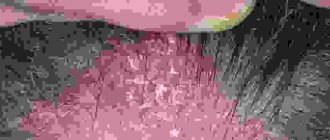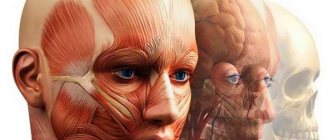Causes of acne
Acne is one of the most common skin diseases.
It is generally accepted that 4 pathogenetic factors play a major role in the occurrence of acne:
- follicular hyperkeratosis;
- increased activity of the sebaceous glands;
- excessive amounts of pathogenic bacteria P. Acnes;
- inflammation and immune response.
These classic links in pathogenesis apply to all types of acne , but when it comes to late acne in women, the following reasons become more and more clear:
- genetic predisposition;
- hormone levels;
- diets;
- smoking;
- stress.
Let's look at the last point in a little more detail.
Back in 1949, Sulzberger and Zaidens wrote: “There is probably no other disease that causes more mental stress, misunderstandings between children and parents, more general self-doubt and feelings of inferiority, and a great deal of mental suffering than acne vulgaris.”
This statement fully reflects how acne contributes to the formation of mental and adaptation problems, but the reverse relationship: stress as a cause of acne formation has been discussed relatively recently.
In physiology, stress is synonymous with general adaptation syndrome.
General Adaptation Syndrome is a set of protective adaptive mechanisms of the body aimed at preserving and maintaining the integrity of the body under conditions of a long-term stressor.
The depth and duration of stress depend on the strength and duration of the damaging factor - the stressor.
A stressor is not only nervous tension or emotional discomfort.
The main stressors in our lives:
- lack of sleep;
- pain:
- hypoxia;
- various antigens (excessive use of drugs, habitual intoxications, frequent viral and bacterial infections);
- strict diets (deficiency of macro- and microelements);
- unfavorable climatic conditions (excess and lack of UV rays);
- psycho-emotional and social pressure from society.
Thus, more and more scientists agree that stress can not only occur as a reaction to diseases and pathological conditions of the skin, but also in itself worsen the health of the skin.
Dependence of allergies on stress
13.05.2021
that illnesses often occur due to resentment, depression and bad mood. When contact with an allergen , the immune system tries to protect the body and then the person begins to cough and sneeze. He develops itching, suffocation, rash and swelling. He complains of a headache and rapid heartbeat.
If stressful situations occur too often, a person experiences emotional stress, and then an active chemical is synthesized in his body that causes inflammation. All states that are uncomfortable for the psyche are perceived as a threat, and the body makes attempts to protect itself. Various diseases appear: eczema , urticaria and edema . We cannot avoid stress and are forced to adapt to it, because of this, psychosomatic reactions begin, leading to the inflammatory process.
What causes allergies?
reduce immunity and increase allergy : low emotional background, depression , prolonged stress. Due to stress, which reduces immunity , allergic dermatitis and colds occur much more often. It turns out that solving the problem of allergic reactions will be much easier if you eliminate the cause of the stressful situation. hormones increase the speed of the immune to the allergen .
Stress provokes allergic reactions if there is a genetic predisposition and aggravates its course. the nervous system malfunctions, the immune system is also disrupted . It is not always possible to see the connection between allergies and stress. This is explained by the fact that symptoms do not worsen immediately after a difficult situation arises and at the time of depression. They appear only after a few days.
Stressful situations increase the likelihood of exacerbation of asthma and other chronic diseases. Factors may include:
- conflicts at home and at work;
- hot temper;
- grief in the family.
If nervous irritants constantly surround a person, the body weakens and becomes depleted, the immune system stops doing its job and allergies that do not have a specific allergen .
Symptoms of stress allergies
Signs of the disease are:
- small rash, itching worsening at night;
- eczema prone to relapse;
- rhinitis with headache and poor health, loss of performance;
- severe cough with attacks of suffocation. Possible transition to bronchial asthma ;
- tachycardia , tremors of the limbs;
- irritability, fatigue, drowsiness, apathy and poor concentration.
Diagnosis of stress allergies
The effectiveness of treatment depends on a correct diagnosis. A specialist allergist conducts 2 examinations: a visual examination and processing of information about the disease obtained after a conversation with the patient and the results of the examinations. If the doctor notices an imbalance in the patient’s condition, he may suspect nervous allergy He examines the skin and mucous membranes, and sends for laboratory tests:
- skin test for the causative agent of an allergic reaction ;
- The level of immunoglobulin is studied. A normal indicator and increased excitability of the patient suggest the presence of pseudo-allergy.
Treatments for stress allergies
Treatment must be comprehensive. Therapy includes medications: antihistamines in tablets and injections, depending on the weak or strong form.
Lesions on the skin are treated with ointment and cream. to effectively cleanse the body of excess hormone .
To treat allergic rhinitis, nasal mucosa is irrigated with saline solutions. Vasoconstrictor drops are not used.
A nervous cough cannot be cured with antitussives. To alleviate the condition, they use inhalations with saline solution and try to humidify the air in the room more often.
Medications are prescribed to normalize the nervous system .
To boost immunity and cure allergies , they take products to improve intestinal .
To cure nervous allergies , eliminate nervous tension and turn to a psychologist to get out of depression . This type of disease requires specific treatment and must be taken seriously.
Published in Allergology Premium Clinic
What explains such a close relationship between stress and acne?
Under stress, two hormonal systems are activated and an increased amount of cortisol is produced, and the concentration of adrenaline also increases.
Stress hormones have both systemic and local effects, including on the skin.
Glucocorticoids produced in the body during stress suppress the secretion of the skin's own lipids and thereby worsen the skin barrier function.
And given the fact that dermatological drugs prescribed for acne often thin the skin barrier, these new data allow us to be especially careful about restoring the hydro-lipid mantle in patients with acne.
Treatment of acne* on the face for nerves
If acne* appears due to nerves, in addition to basic drug treatment, you may need to prescribe sedatives and consult a psychologist. Appointments between the dermatologist and other specialists must be coordinated.
Azelik®5 gel can be used in the treatment of mild to moderate acne. This is an azelaic acid preparation that has the following effects5:
- exhibits antimicrobial activity against Propionibacterium acnes and Staphylococcus epidermidis;
- contributes to the normalization of keratinization processes;
- helps reduce fatty acid levels;
- helps reduce inflammation by reducing neutrophil metabolism and their synthesis of free radical oxygen species.
The first results from treatment with Azelik® gel, as a rule, become noticeable after 4 weeks of its use5.
Third stress system?
Relatively recently, a theory arose that in addition to the two classically known stress systems, there is a third one, and its fibers are located directly in the skin and, moreover, their terminal processes penetrate the most superficial layers of the epidermis.
Pavlovic S. and a group of comrades demonstrated during experiments that peripheral nerve fibers are capable of transmitting stress impulses to the skin, increasing inflammatory processes in it.
And since inflammation is one of the key links in the development of acne, serious research and development of external cosmeceuticals began, aimed at inhibiting the activity of the third stress system.









